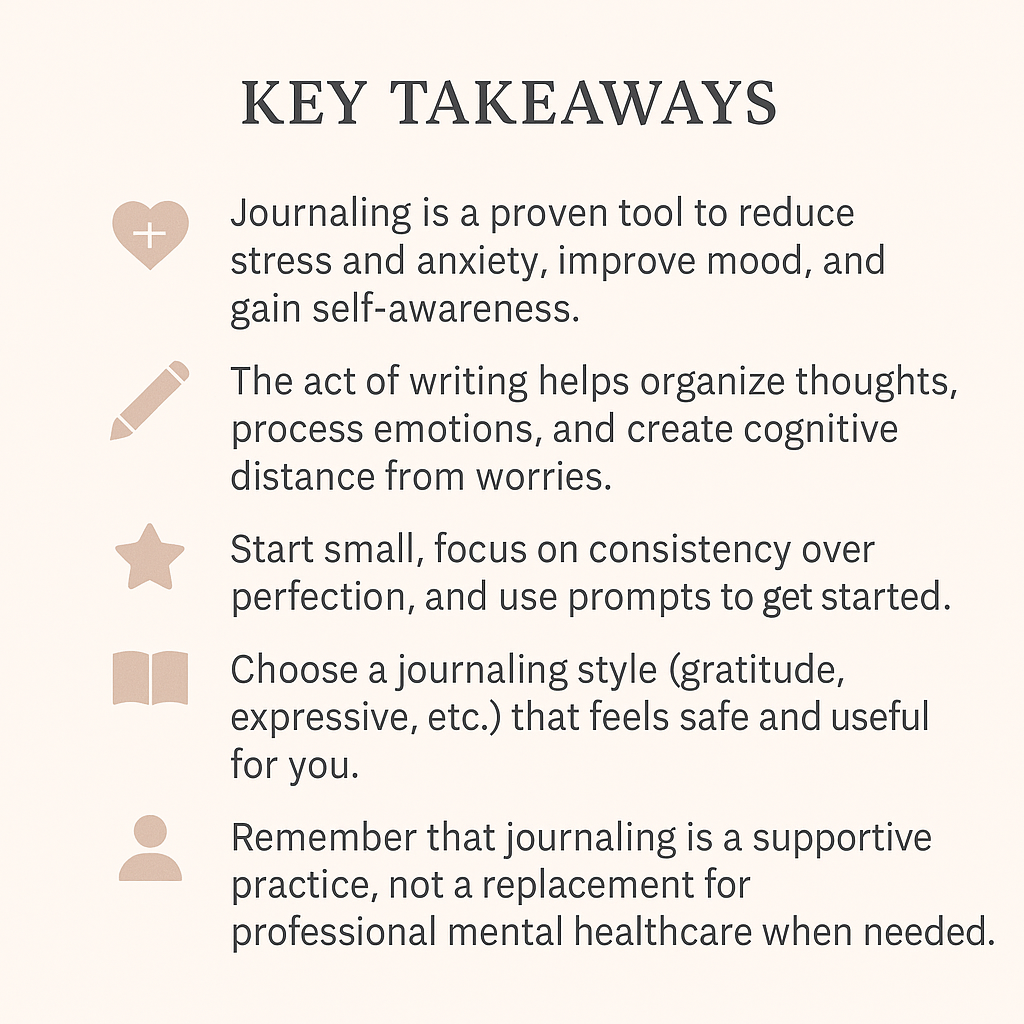Benefits of Journaling for Mental Health: Real Ways to Heal & Grow

Sarah Johnson, MD

Do you often feel like you have too much to do, are worried, or can't think clearly? Do you feel like your brain is a browser with too many tabs open? These sensations are normal in our fast-paced environment, but they don't have to last forever. Journaling for mental health is one of the simplest and most effective tools for emotional regulation and gaining clarity. It offers significant benefits of journaling for mental health, including stress relief, mindfulness, and deeper self-reflection.
This isn't about writing down everything that happens every day. Instead, it's about using writing as a way to deal with your feelings, lower your stress levels, and lift your spirits. Putting your thoughts down on paper instead of letting them spin around in your head gives you distance and perspective, which lowers your anxiety.
This post will show you how to do everything. We'll look at the theory behind why writing helps, the real advantages you may expect, and some examples and suggestions you can apply right now. We'll also answer frequently asked questions and provide you advice on how to make journaling a habit that lasts and helps you.
If you need more structured guidance, exploring a Mental Health AI can be a helpful next step.

What Does “Journaling for Mental Health” Really Mean?
Journaling for mental health is a purposeful activity that focuses on exploring your thoughts and feelings, not just writing down what happens every day. It includes a few important steps, all contributing to the core benefits of journaling for mental health:
- Expressive Writing: Writing about your deepest ideas and feelings without holding back, frequently concerning stress or tragedy.
- Reflective journaling is when you write about things that have happened to you in the past to find meaning, learn lessons, and get to know yourself better.
- Gratitude journaling is the practice of writing down things you are thankful for on a regular basis. This trains your brain to focus on the good things in life.
At its core, writing helps you process your emotions and build self-awareness—not just document daily events—revealing the deeper benefits of journaling for mental health such as enhanced mental clarity and emotional balance.
There are many ways to explore journaling practices that support mental health. Whether you write freeform, follow prompts, or reflect on your emotions, each approach helps you process feelings and strengthen your emotional awareness in a safe, structured way.
The Science Behind the Benefits
There is empirical evidence that writing in a journal has positive impacts, not simply stories. Research, including groundbreaking work by psychologist James Pennebaker, shows that expressive writing reduces anxiety, emotional overwhelm, and symptoms of depression—clearly underscoring the therapeutic benefits of journaling for mental health and emotional processing.
The mechanism functions on multiple tiers. Writing makes the brain calm down and put together disorganized thoughts. This is called cognitive restructuring. This helps you figure out what makes you feel certain ways and what patterns you have in your emotional responses. Second, you can create cognitive distance by naming your feelings, like "I'm worried about this work deadline."
You are no longer fully engaged in the anxiety; you are witnessing it from a distance, which lessens its strength. There is also evidence that physical benefits, such better sleep and a stronger immune system, are likely linked to lower levels of the stress hormone cortisol, further demonstrating the wide-ranging benefits of journaling for mental health.
Key Mental Health Benefits You’ll Feel
The benefits that are talked about in theory show up in actual life as tangible enhancements. Writing in a journal regularly can lead to a wide array of benefits of journaling for mental health, including:
- Less Stress and Worry: Writing down your issues over and over again can help you stop thinking about them all the time.
- Less Stress: Writing about things that make you stressed out helps you deal with them, which makes you feel more at ease.
- Better Mood and More Thankfulness: Writing in a gratitude diary immediately fights negativity bias, which leads to a more cheerful view.
- Better Self-Awareness: Writing down your ideas on a regular basis gives you a clear picture of how you act and feel throughout time.
- Clarity and Insight: When you untangle your thinking, you can see beliefs that are holding you back and get ideas about how to solve problems.
- Greater Physical Wellness: Less stress can lead to greater sleep and fewer health problems associated to stress, rounding out the holistic benefits of journaling for mental health.
Common Misconceptions & Limits
When you start journaling, it's crucial to have reasonable expectations. It won't magically fix serious mental health problems like PTSD or major depression. If you are having a lot of trouble, writing in a journal should be used to support professional help, not replace it, to fully and safely realize the benefits of journaling for mental health.
Don't forget that your journal doesn't have to be flawless, written every day, or look nice. You might write a whole paragraph on some days and just one sentence on others. Also, know that writing that is very expressive might occasionally bring up bad feelings for a short time. This is normally part of the procedure, but you can stop and come back to it later.
Real Examples & Types
There is no one "right" approach to write in a journal. Try different things to see what works for you and discover the benefits of journaling for mental health through various styles:
- Gratitude Journaling: Writing down three things you're thankful for every day.
- Expressive Writing: Setting a timer for 15 to 20 minutes and writing nonstop about an emotional problem.
- Mood and Trigger Tracking: Keeping track of your mood every day and the things or ideas that led up to it to find out what sets it off.
- Bullet Journaling: An organized, visual way to plan, track, and reflect on your life.
- Reflective Journaling: Writing a message to your previous or future self or thinking on a recent problem and what you learnt from it.
Trying different journaling techniques helps tailor the experience to your needs and amplifies the benefits of journaling for mental health, especially in areas like anxiety relief, mindfulness, and daily self-care.
For some people, pairing writing with reflection from books can be deeply healing. Combining reading and journaling encourages new insights and emotional growth, helping you integrate lessons from others’ stories into your own self-discovery.
Practical Tips to Get Started
It can be hard to start a new habit. Keep things easy:
- Pick your medium: Choose what works best for you: a pretty notebook, a basic Word document, or a journaling software.
- Find a time that works for you, like when you have your morning coffee or immediately before bed.
- Start Small: Promise yourself to do just one prompt or five minutes a day. Small steps help you get going.
- Make a Safe Space: Tell yourself that your notebook is a place where you can be yourself without being judged. No one else will see it.
Your environment also plays a major role in how clear your mind feels while you write. Reducing distractions and creating physical calm supports your emotional process. Learning more about the link between clutter and mental health can help you design a space that nurtures focus and reflection.
Prompts & Exercises You Can Use Today
A prompt can be the perfect thing to get you started if you don't know what to write. Try one of these:
- What emotion do I experience the most today? Where in my body do I feel it?
- Write down three little things that went well or that you liked today.
- What is one thing that worries me? What can I do to change this situation?
- Tell me about a hard time you had this week. What thoughts did I have, and how did I react?
- What would I say to myself if I could be as kind as I wanted to be?
Making Journaling Last: Habit-Building Strategies
Not being perfect is the key to getting long-term benefits of journaling for mental health.
- Habit Stacking: Link writing to a behavior you already have (such as "after I brush my teeth at night, I will write for five minutes").
- Use Cues: Leave your journal on your pillow or set a reminder on your phone.
- Focus on Consistency: Don't worry about the quality of your entries; some will be deep and others will be boring. The act of showing up is what matters.
- Be Flexible: If you skip a day or a week, just go back to it without feeling bad. There are no rules. This flexible approach is key to sustaining the benefits of journaling for mental health over time.
Writing in a notebook every day may not make a big difference right away, but over time, these modest, regular moments of self-reflection can lead to big changes, unlocking the profound benefits of journaling for mental health. Think of journaling as a present to yourself—a daily time to feel comfortable, get new ideas, and let go of your feelings.
Journaling can also be a powerful tool when you feel stuck or uninspired. Writing helps reignite your sense of direction, especially during emotional burnout. If you’re struggling to rebuild your drive, explore practical ways to get out of a motivation slump and rediscover your inner energy.
You don't have to write a whole book. For five minutes, start with just one prompt today. This is your own path, and the most important thing is to be as honest as you can to truly experience the benefits of journaling for mental health.
FAQ about Benefits of Journaling for Mental Health
How often should I journal to see mental health benefits?
Studies show that even 15 to 20 minutes, three to four times a week can be very helpful. But consistency is more crucial than how often you do it. Getting into the habit can be easier if you start with just a few minutes each day.
Is handwritten journaling better than digital?
Some studies say that writing by hand can slow down your thoughts and improve your processing, but the optimal way is the one you'll really utilize. If it's easier for you, digital journaling works just as well.
What if journaling makes me feel worse sometimes?
It's typical for writing a lot to make you feel bad. If it seems too much, take a break, take care of yourself, and come back to it later. If your bad sentiments don't go away, you might want to talk to a therapist.
Can journaling replace therapy or medication?
No. Journaling is a great way to take care of yourself and deal with everyday stress, but it can't replace getting a professional diagnosis and treatment for significant mental health problems.
What is the best journaling method for anxiety?
If you're feeling very anxious, "brain dumping" all of your troubles onto a page will help right away. Keeping track of what makes you anxious and writing in a gratitude journal are both very helpful for long-term management.
You can also reflect on your relationship through journaling, noticing what moments bring connection or distance.















